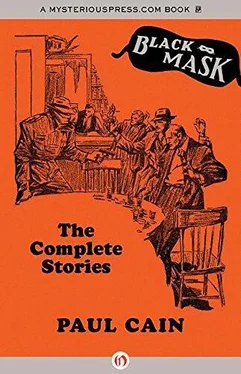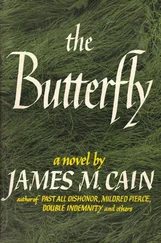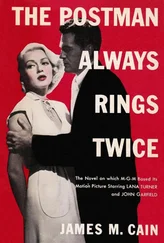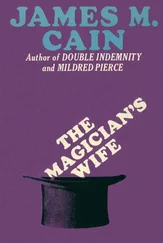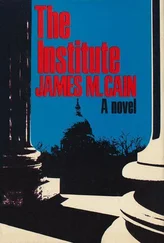Kells pried the revolver out of the little man’s hand and stood up. He balanced the revolver across his fingers and a kind of soft insanity came into his eyes. He shook out the match and went back along the dark passageway, through the compartment where the overalled man was sleeping, up to the L-shaped storeroom. In the far end of the L there was another narrow door. Kells swung it open softly. Swanstrom was sitting at the desk with his back to the door. Another man, a spare, thin-haired consumptive-looking man, was sitting on a chair on the platform, one of the .30-30s across his knees. He looked at Kells and he looked at the big blue revolver in Kells’ hand and he put the .30–30 down on the platform.
Swanstrom swung around and opened his mouth, and then he smiled as if he was very tired.
Kells said: “Twenty-four hundred, and goddamned quick.”
A thin moan of saxophones came down to them from somewhere above.
Swanstrom inclined his head towards the desk. He said, still with the tired smile: “I ain’t got a key.”
The other door opened and Rose and O’Donnell came inside. They stood still for perhaps five seconds; O’Donnell was almost directly behind Rose. He closed the door and then he reached for the lightswitch on the bulkhead. Kells squeezed the big Colt. O’Donnell fell forward to his hands and knees, shook his head slowly from side to side, sank down and forward onto his face.
Most of Kells’ face was dark with dried blood. His eyes were glazed, insane. He said: “Anybody else?”
He swayed. He moved slowly towards Rose. Swanstrom was staring at O’Donnell; Swanstrom stood up, and in the same instant someone knocked heavily on the door, the knob was rattled. Someone shouted outside. Kells moved toward Rose. His cold eyes and the slim blue barrel of the revolver were focused on Rose’s belt buckle.
Rose licked his full lower lip, and sweat glistened on his dark forehead. He put one hand into his inside pocket and took out the folded sheaf of hundred-dollar notes, held them towards Kells.
Kells took them and nodded. He grinned, and the grin was a terrible thing on his bloody face. He backed slowly, carefully to the door through which he had entered. He said, “First man through gets one in the guts,” backed out and closed the door.
He went swiftly to the hatchway, down. The man who had been asleep had gone. Kells went through the passageway to the little man, lighted a match and saw that he was conscious. His eyes were open and he smiled up at the flare of the match and kicked viciously at Kells’ knee.
Kells said: “Now, now — Garbo.”
He gripped the little man by the collar and dragged him along the passageway. There was sudden faint light at the after end and he waited until a shadow came into the light, shot at it, once, twice. The sound was like thunder in the narrow space.
They went on laboriously, Kells dragging the little man, the little man cursing him softly, savagely. The after end of the passageway was dark now. Kells sucked in breath sharply. There was acrid smoke in the darkness; something more than the smell of black powder. It was like burning wood. Kells pressed his body against the bulkhead and risked another match.
A little way ahead there was a large rectangular port in the ship’s side, another on the inboard side of the passageway. It was evidently a coaling port. The match flickered out and Kells edged forward, felt in the darkness for the big iron clamps which held the port closed. They were stiff from disuse but he strained and tugged until all but one were unscrewed, laid back. The last he hammered with the butt of the revolver until it gave; thrust all his weight against the plate. It creaked, slowly swung outward.
The sea was black, oily. The fog had thinned a little and the ship rolled lazily on a long, even ground-swell. Far to the left, Kells could see yellow sky over Long Beach, and to the right a distant winking light that might be the Eaglet. There was no sign of the launch.
Then he heard shouting and the sound of people running on the deck above him. He waited, listened, looked at the sea. The black water reddened; Kells leaned far out of the port and saw a long tongue of flame astern. As he watched, the water and the sky brightened. All the after quarter of the ship was afire.
When he again looked forward, a launch had rounded the bow, was idling about two hundred yards off.
Kells stopped, put the revolver down, and took hold of the little man’s shoulders. “Pull yourself together, baby,” he said. “We’re going bye-bye.”
He lifted limp, dead weight, saw that the little man was again unconscious.
Kells untied and kicked off his shoes. He took out the revolver and fired twice into the red darkness. By the mounting glow from astern he thought he saw a white hand raised; the launch swung towards him in a wide circle.
He put the sheaf of crisp bills into his hip pocket, buttoned the flap. He took off his coat and threw it into the sea. He picked the little man up in his arms, got him somehow through the port, and dropped him. Then Kells stood on the lower edge of the port, took a deep breath, dived. There was darkness and the shock of cold water.
He came to the surface a few yards from the little man, reached him in two long strokes and hooked one hand under his armpit. The shock had revived him; he struggled feebly.
Kells grunted, “Take it easy,” and swam towards the launch.
The red-faced man whom Kells had talked to on the wharf leaned over the gunwale; together they hoisted the little man aboard. Then the red-faced man helped Kells. He had been alone on the launch. He went to the wheel.
Kells took off his trousers and wrung them out. He said: “How come you’re alone?”
The red-faced man put his wheel hard over, spat high into the wind. “Rainey said for you to go chase yourself,” he said. “I went back to the wharf and then I got to worrying, so I come out by myself.”
Kells squatted beside the little man, looked back at the Joanna. Her after third was an up and down pillar of flame.
“Looks like a fire to me,” he said. He looked down at the white, drawn face. “You’ve been playing with matches.”
The little man smiled.
“It’s a fire, sure enough.” The red-faced man touched the throttle. Then he added: “There ain’t much of a crowd. They’ll all have a lifeboat apiece.” He chuckled to himself. “You’re pretty wet,” he said. “Where do you want to go?”
Kells said: “ Eaglet .” He put on his pants.
Rainey sat in a big chair behind a desk. He was a very big, powerfully muscled man with straight black hair, a straight nose, and empty ice-gray eyes.
There was a woman. She sat at one side of the desk with a large glass in her hand. She was very drunk, but in a masculine way.
Kells stood across from Rainey. His expression was not pleasant. He said: “What’s it all about? Were you trying to get me killed?”
Rainey said: “Why not?”
The woman giggled softly.
Rainey turned his head without changing his blank expression, looked at the little man who had been carried into the cabin, laid on a couch. “Who’s your boyfriend?”
The woman said: “Nemo Kastner of K.C. — little Nemo, the chorus boys’ friend.”
Kells looked at the woman. She was blonde, but darkly, warmly. Her mouth was very red without a great deal of rouge, and her eyes were shadowed and deep. She was a tall woman with very interesting curves.
Rainey said: “This is Miss Granquist.”
Kells nodded shortly. He took a bottle and a glass from the desk, went to the little man.
Fay got up and went to one of the ports. He looked out at the Joanna , a spur of fire against the horizon. “Beautiful!” he said — “beautiful!” Then he turned and went over to where Kells knelt over little Kastner.
Читать дальше
